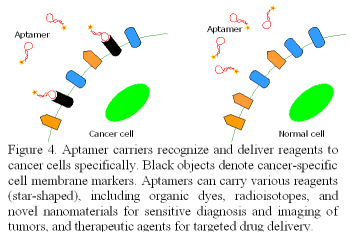Research Projects

DNA Aptamers as Cancer-specific Sensors and Nano-carriers
R&D Team: Dr. Weihong Tan1,2, Dr. Donn Dennis3, Dr. Charles Martin1, Dr. Stratford May2, Dr. Zhiwen Tang1, Mr. Colin Medley1
1Department of Chemistry, 2Shands Cancer Center, 3Departmrny of Anesthesiology
Opportunity and Impact: Using a systematic selection process developed in the PIís laboratories, highly efficient DNA-based molecular probes (aptamers) can be identified easily and quickly for reliable detection of cancer or other disease cells. These aptamers specifically recognize the unique molecular biomarkers on the cell surface, thus ensuring excellent capability of distinguishing disease cells from normal cells and making use of this ability in early disease diagnosis and targeted therapy.
Currently, there are no other techniques that can rapidly produce groups of molecular probes for practical and effective diagnosis of diseases such as cancer. On the other hand, the aptamers we will generate for various cancer cells can be readily applicable to many relevant medical fields. Our aptamers will be developed into cancer-specific nanometer-sized carriers by taking advantage of their high affinity and specificity for the cancer cells (Figure 4). They will be conveniently linked to organic dyes, radioisotopes,  and novel nanomaterials for early diagnosis of cancers based on exfoliated cells, as well as for imaging of early-stage tumors with high contrast. Aptamers can also carry therapeutic agents for tumor-cell-specific drug delivery. Side effects will be reduced while efficacy of clinical treatments will be improved.
and novel nanomaterials for early diagnosis of cancers based on exfoliated cells, as well as for imaging of early-stage tumors with high contrast. Aptamers can also carry therapeutic agents for tumor-cell-specific drug delivery. Side effects will be reduced while efficacy of clinical treatments will be improved.
Aptamers have many other features that make them more suitable for direct clinical applications than the limited number of molecular probes currently available. These include relatively small sizes, very simple and economical production, easy to attach to signaling tags or therapeutic agents, and good stability. Our aptamers developed for disease cells are among the first examples of linking aptamers to meaningful biomedical applications, and have the potential to bring about great impact and open up tremendous new opportunities in disease diagnosis and therapy.
Project Description: Groups of new aptamer probes need to be generated for specific recognition of cancer cells (lung cancer, ovarian cance and liver cancer). Even though well-established protocols will be applied, we expect the solid tumor cells will be quite different from suspension cells we used as targets before. Thus the procedures will be optimized for these cells and a variety of new techniques and equipments will be employed to conduct the selection, monitor the progress and characterize the product. Further, the selected aptamers need to be optimized in terms of sequence, size, affinity, and biostability. Our solid experience in molecular engineering and sensor development should greatly help achieve this goal. Finally, applications of the optimized aptamers need to be carried out in clinical or near clinical environments, which have not been demonstrated by us before. We believe sufficient funding will enable us to acquire clinical samples and equipments necessary for all tests. In addition, the multi-disciplinary expertise in our proposed research team will be highly beneficial to the success of the final goals.